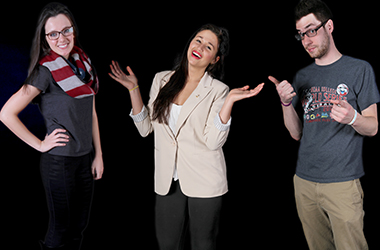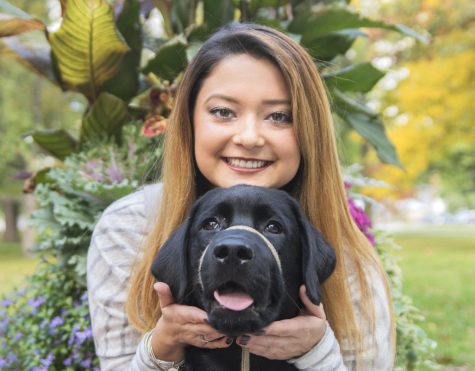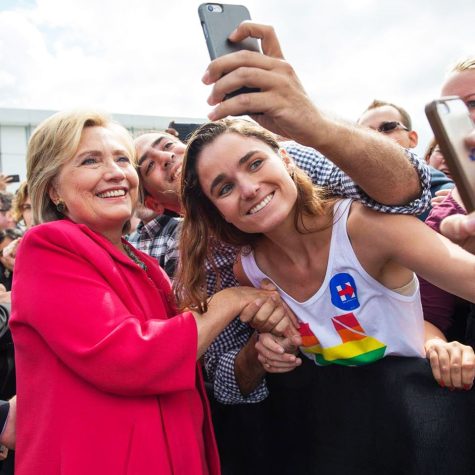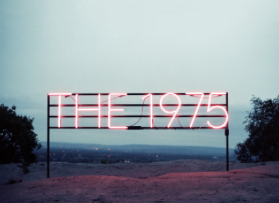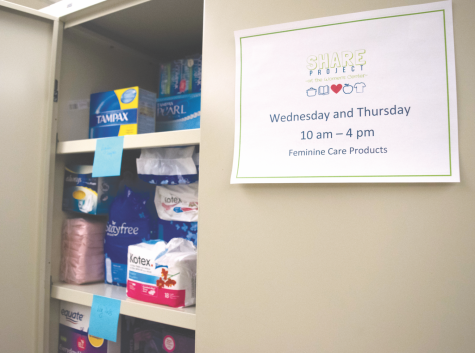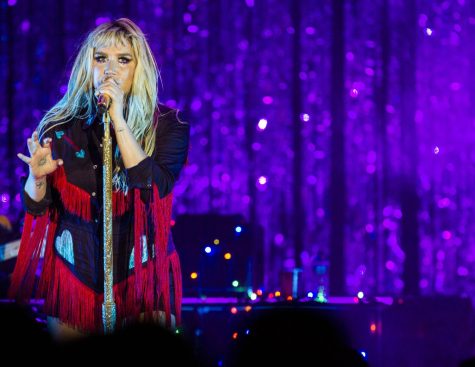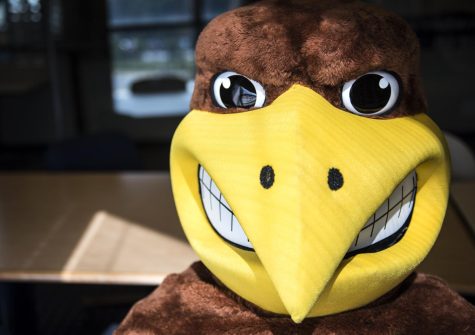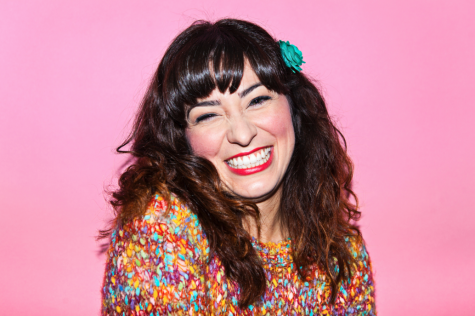Don’t sweat the photoshopping: Students promote positive self-perception in a world of false media images
February 26, 2014
Senior fashion merchandising major Kelsea Freeman admits that she has days where she struggles with her body image. But Freeman has found a way to work through what she considers “bad days.”
“I try to stay as positive as possible,” she said. And she does it with a solution that she recommends for anyone having doubts about themselves.
“When you are getting ready in the morning, find one thing about yourself you believe looks good in that moment,” Freeman said. “Write that quality on a Post-It note and stick it to your mirror. In a few weeks, your mirror will be covered in positive, beautiful qualities. It’s a nice reminder of how awesome you are every morning.”
Freeman is a part of Kent State’s Body Acceptance Movementr, a relatively new student organization on campus. Founded in 2012 by then-graduate-student Colleen Fitzgibbons, the group looks to promote self-acceptance through awareness and activism. Freeman is the social media coordinator for the group, and her bubbly personality shines through in the Facebook, Twitter and Instagram posts she writes, which she feels are her way of contributing to battling body-image issues.
“I personally contribute to this effort through the inspirational and happy posts I make to BAM’s social media pages,” she said.
Freeman became involved with the group through her best friend and junior communications major, Megan Carrasco. Carrasco is the president of the organization and became so after getting involved with the group and previously struggling with an eating disorder herself.
“I struggled with an eating disorder for a good couple years of my life,” she said. “When I went away to college and found BAM, things definitely got better, and I decided that this was something I was passionate about and wanted to do more with.”
Carrasco is not alone in having fought an eating disorder, and it is a problem that is widespread across the United States. According to the National Association of Anorexia Nervosa and Associated Disorders, nearly 24 million people of both genders and all ages suffer from an eating disorder in this country. Eating disorders include anorexia, bulimia and binge eating disorder. While 24 million people will suffer from these diseases, only one in 10 will receive the proper treatment.
Groups such as BAM are looking to raise awareness about these issues. This week has been National Eating Disorders Awareness Week, and the group has sponsored a number of activities to get students involved and aware of what the diseases entail. This includes a question-and-answer session on eating disorders with a panel, information tables in the Student Center and a Love Your Body yoga session.
“I’m really proud of how well this has been put together,” Carrasco said. “We do awareness, activism and educational activities. We like to have fun, too.”
Andy Rolinc is the vice president of the organization and, while new to the role, is stepping up with Carrasco to give presentations and to be a consistent leadership presence. Rolinc became involved with the group after Carrasco pushed him to attend the first meeting of the school year, and he quickly found it was something he could become attached to.
“At first, I didn’t think much of it, but Megan urged me to attend that first meeting,” he said. “I noticed that there were very few males involved with the organization, and I saw an opportunity to not only share the male opinion on topics that are discussed but to be an outlet to help others in a time of need and to help those who are struggling with problems of body image.”
With Rolinc present, both genders are represented in discussions ranging from eating disorders to sexual awareness. And, of course, one issue that consistently arises when discussing body image is the portrayal of individuals in the media — especially on magazine covers and in advertising.
“We were made to be real, not fake,” Freeman said. “Sadly, we are living in a world where the media wants us to like fake more than real. I wish it would change, but I think it is going to take a long time for that to happen.”
Incidents of Photoshopping in the media and controversies surrounding it are nearly constant. Just days into the New Year, Mindy Kaling, star of “The Mindy Project” and “The Office,” was featured on the cover of Elle magazine’s women in television issue. The magazine had four covers for the given issue, which also featured actresses Zooey Deschanel, Amy Poehler and Allison Williams and received backlash for its treatment of Kaling in comparison to the other actesses. While Deschanel, Poehler and Williams all had full-length, full-color covers, Kaling’s was done in black and white and close up. The argument, of course, was that Kaling was not as perfect as the others and so could not be featured fully like the other, more perfect white women.
Kaling isn’t alone. Photoshop controversies come up regularly, especially in a world where digital whizzes can quickly edit together GIFs of before and after images. Just this year, Lena Dunham and Jennifer Lawrence have also been met with questions of Photoshopping. Dunham’s situation got heated enough that it seemed no side was right as Dunham appeared on Vogue’s cover — just look up Lena Dunham and Jezebel for more information.
Rolinc said that even a year ago, this is something he might not have cared about as much. However, after being involved with the group, he recognizes the need for awareness of Photoshop in media and advertising and the unrealistic standards it can give individuals.
“I have become outraged by all of the Photoshopping that I see in our mainstream advertising,” he said. “Young girls and boys grow up looking at images of models that are beyond unrealistic, and it certainly can have a negative image on how they view their own bodies.”
Statistics from the National Eating Disorder Association show how pervasive media can be in shaping body images. Six out of 10 teenage girls report that they feel insecure about themselves when comparing their bodies with those of the models they see in media. Meanwhile, four out of 10 middle- and high-school boys say they tend to regularly exercise with the goal of increasing their muscle mass. Both genders are influenced by what they see in the media; this even extends to social media. More than 80 percent of respondents in one survey — both male and female — said that social media sites like Twitter and Facebook hurt their body confidence.
“The best things we can do include speaking out and constantly reminding ourselves it is impossible to look the way that airbrushed model looks because he or she does not even look like that,” Freeman said.
It can be difficult to maintain a positive body image when messages from media are constantly reminding the viewer, reader or Tweeter what “perfection” is. It can be easy to succumb to pressure to be what one medium thinks is ‘perfect’ or ‘ideal,’ ” and this is something all the members of the group recognize. However, the group is working to combat this every day.
“Honestly, a healthy body image is a combination of countless things,” Rolinc said. “One of the main things is to be educated about how contradicting the media messages are in relation to what a healthy body truly is. Any person can achieve a healthy body image through the right support system! You just need to be happy with yourself in your own body.”
Carrasco echoes many of the same sentiments, further stating that it’s OK to love yourself the way you are.
“There is no reason that we should compare ourselves to others or have a bad day because you feel a little extra chubby,” she said. “I try to be a leader on this campus, and that’s something that is fulfilling and makes me happy, and I want other people to feel that way, too.”
The organization meets every other Monday in the Student Center, typically in Room 309, and Carrasco encourages students to join and become a part of the awareness campaign.
“BAM provides support and education to this campus community,” she said. “I want it to be a movement that more people participate in.”
Contact Katy Coduto at [email protected].


